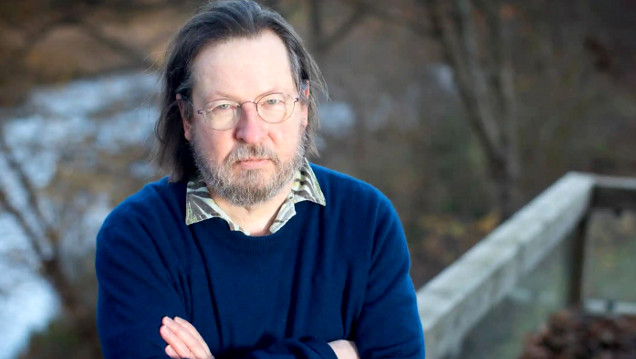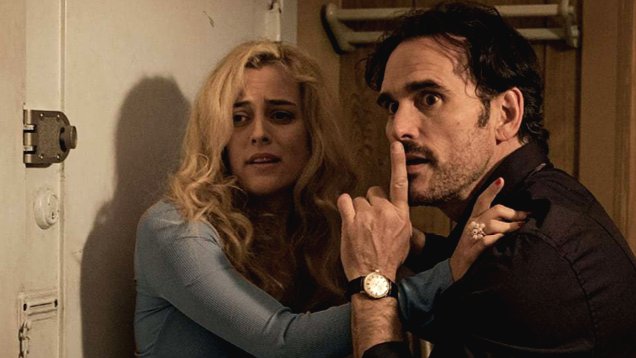Interview: Lars von Trier on violence, death and pushing the boundaries

Lars von Trier, one of the world’s most provocative and divisive directors, needs no introduction. The controversial filmmaker opens up to Sarah Ward about death, mortality, violence and more.
Seated in front of a computer screen in Copenhagen, Lars von Trier cuts a surprising figure. His tattooed knuckles are shaky, his voice wavers and his reputation for provocation initially seems at odds with his current state. But ask him about his latest film, The House That Jack Built, and he’s firm and decisive: “I thought that I was home free because I was making some violence, and it’s so common.”
Following an American man (Matt Dillon) who compulsively slashes his way through women, reveres his murders like they’re works of art and wants nothing more than to be acknowledged for his mastery, The House That Jack Built has earned mixed reactions. Of course, that’s one of von Trier’s trademarks, with the serial killer thriller almost bringing him back to his beginnings. The filmmaker started his feature career with 1984 neo-noir The Element of Crime, which showcased his penchant for darker material and his divisive nature.
While it won the Technical Grand Prize at the Cannes Film Festival, “only one third of the audience was left after [the screening]”, von Trier reflects. And, as the world has witnessed for more than three decades, his relationship with that particular festival and with viewers in general has proven a rollercoaster ride ever since.
After a seven-year absence from the Cannes lineup, The House That Jack Built marked von Trier’s return to the French event — after “all of this nonsense at the press conference.” He’s describing the fallout from his controversial comments in 2011 while discussing the well-received Melancholia, where von Trier declared himself a Nazi and was declared persona non grata by the festival in response.
Unsurprisingly, heading back to the Croisette in 2018 inspired both applause and more walkouts.
“It’s not so bad; it shows that people react to things,” he comments about the response this time around, although he didn’t spy that many viewers leaving the theatre from where he was sitting. He characterises The House That Jack Built, its confronting violence, its treatment of its protagonist and its inclusion of humour as “a little mind game that I’m playing with the audience”, making them simultaneously empathise with and abhor the eponymous Jack.
“Somehow within the core of the film, you kind of hope the police will not get him, even though he’s the most terrible, mean person that you can see… [But] I think it would be cheating if you didn’t feel bad about the violence. It’s a film about a serial killer — of course there’s violence. I could do it in a Hollywood way where you didn’t see those things, and where it was just cut out. And I’m sure it’s going to be cut out in some places. But I think it had to have the humour and the seriousness at the same time.”
Across a filmography that includes Breaking the Waves — the movie he thinks audiences would like to see him revisit; “they’d like to see a number two or three,” he offers — as well as Dancer in the Dark, Dogville, Antichrist and Nymphomaniac, von Trier has become accustomed to hearing the terms that have been lobbed The House That Jack Built‘s way. Being labelled as provocative and polarising isn’t new for him, and isn’t unwelcome either.
“I’m from a generation where being a provocateur was a good thing,” he explains. “For me, it is morally important that people provoke. Basically, the times when things have gone really wrong in the world are when everybody has stayed quiet.”

Courting controversy has its consequences, as seen not only in his tumultuous time at Cannes, but also in his collaboration with Björk on Dancer in the Dark. In 2017 at the height of the #MeToo movement, the Icelandic singer commented on sexual harassment at the hands of “a Danish director”, allegations which von Trier has denied.
Still, when asked about The House That Jack Built’s savagery and any purposeful parallels with the art of filmmaking, he advises “you have a tendency to hurt and misuse other people when you do a film, or any work of art.” And he’s quick to mention Björk when describing his need to pushing creative boundaries.
“I actually discussed this with Björk, and I said that we felt alike because if she starts a melody on C, she would never end it on C. It’s like me, if I make the start of a film [happy], it would never end happily. It’s the same resistance — and endings in general are difficult and unsatisfactory.”
Endings and mortality have clearly been weighing on von Trier’s mind of late. Asked about the many death scenes in The House That Jack Built and in his work in general, he credits his own fears as his guide.
“My only approach is that I’m so afraid of the situation myself that maybe I’m good at imagining it. I’m very good at catastrophic thoughts, as we call them in a diagnosis. So, maybe I’m a little too good at it. But since we have this quite tough, rough style of camerawork [in The House That Jack Built], it becomes more real, I think.”
In Australia, the film releases shortly after the death of acclaimed Swiss actor Bruno Ganz, whose largely unseen character of Verge waxes lyrical with Jack about life, philosophy, art and morality.
“After The American Friend, he’s been an icon — and I’ve worked with one of my icons before, Ben Gazzara, and it’s really difficult to direct icons because you think that it’s great that they’re just there.” The House That Jack Built is also von Trier’s first film since the death of David Bowie, another of his heroes and an unforgettable presence on the movie’s soundtrack. On Bowie’s passing, he notes, “I’m very disappointed that he’s dead because he’s supposed to come from Mars — and he shouldn’t be the dying type.”
Next, it might be von Trier who’s saying goodbye by stepping away from the camera.
“I’m talking now as if I’m not going to make another film, and you never know, but I think I have used my time in a good way,” he reflects. “As I’ve said, I’m the world champion in catastrophic thinking. It was okay to be 50, but to be 60 [and doing this] is kind of… And then Bowie died, and he was 68 or something.”

















